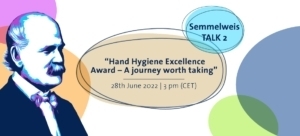In view of increasing nosocomial infections and costs for the national economies, infection prevention is becoming more important. What are the challenges to perform a good disinfection management? We asked Dr. Heide Niesalla, Head of BODE SCIENCE CENTER, founded in 2011 by The HARTMANN GROUP – one of the leading European providers of medical and hygiene
products.
Consistent hygienic measures are the key to lower infection rates, including those with multidrug-resistant pathogens. Hand disinfection is the world’s most important preventive measure for hospital infections. However, it`s potential for prevention is not yet nearly exhausted. Improving compliance in hand disinfection can lead to a reduction of up to 40 % of healthcare-associated infections (HAIs). Recent figures from the Robert Koch Institute in Germany on hand hygiene show that on average only between 41 % and 55 % of necessary hand disinfections are carried out in hospitals. There are indications from studies that infections can only be significantly reduced with a compliance rate of 80 % or more. If such a high impact can be achieved with such a simple measure, the question arises: How can hospitals be supported in the best possible way to implement the necessary hygienic measures which are not negotiable from the point of view of infection prevention and patient protection? In short: The main challenges are to rise awareness for necessary (or needed) hygiene measures and employees` compliance with hygiene.
How far does the portfolio of HARTMANN comply with the requirements you have described in question one?
HARTMANN’s Hand Hygiene Evolution Concept for hospital hygiene management is a holistic multi-modal approach to systematically enhance compliance in hospital hygiene to avoid healthcare-associated infections. It was launched in 2016, focusing on hygienic hand disinfection in hospital wards, including support to build up the hospital infrastructure for hand hygiene products and dispensers, trainings, and monitoring e-health software solutions for clinical practice. As of May 2017 a new module (module 6) for the Hand Hygiene Evolution Concept will be available to focus on process optimization and standardized operating procedure (SOP) Monitoring. The SOPs available focus on nursing tasks for the most common HAIs and consider all infection-relevant steps of the respective task. For optimizing the nursing and medical activities, the respective tasks were observed and divided into individual steps. All actions crucial for infection prevention were identified and were then, together with the other work steps, brought into a logical order. A multimodal intervention package comprising checklists, e- learning tools, classroom training slides and an e-health application for compliance observations helps establish the SOPs as standard. As for the other materials provided with the Evolution Concept, the SOPs were developed by the BODE SCIENCE CENTER – HARTMANN’s scientific center of excellence for hygiene and infection protection. The BODE SCIENCE CENTER translates science based knowledge into practical use and serves as a trusted partner in applying and implementing hygienic measures with the overall goal to prevent infections and increase patient safety. www.bode-science-center.com
What are the special challenges in Hungary?
In Hungary, the special challenges are the cost cuttings in the hospital budgets and tenders, where in 90 % of the cases, the price is the deciding factor.
Is the situation comparable with other CEE countries. And if yes – with which of them? Can you describe a little bit the situation in comparison to other countries?
Yes, hospitals in most CEE countries have a huge budget pressure. Hygienists need to discuss with buyers and material management regarding the purchase decisions for hygiene management. What is the strategy? It is not only to prevent scandals but also to aim higher and to become a successful, well-organized clinic with an ideal hygiene management. Multi-modal hand hygiene improvement strategies are well proven and the gold standard. To keep investing in hygiene is very important: Hand Hygiene is the most important measure to prevent HAIs, and the HARTMANN Evolution Concept, gives you the critical key.
What do you expect from the Semmelweis CEE Conference?
We look forward to meeting the well-known experts and exchanging the latest news and developments in the field of hospital hygiene, as well as to network and exchange experiences with our customers and colleagues from abroad. The Semmelweis Conference is a great opportunity for inspiration and networking activities.
About the HARTMANN GROUP
The HARTMANN GROUP is one of the leading European providers of medical and hygiene products with core competences in wound treatment (e.g. wound dressings, negative-pressure wound therapy, conforming bandages, plasters), incontinence care (e.g. disposable incontinence briefs and pads as well as products for skin care in case of incontinence) and infection protection (e.g. surgical drapes, operating theater clothing, disposable surgical instruments and disinfectants). The portfolio is supplemented by products for compression therapy and first aid. Moreover, HARTMANN offers innovative system solutions for professional target groups in the medical and care sector. The company with its headquarters in Heidenheim/Germany, whose priority market is Europe, has operations around the world. In addition to a number of foreign sales companies, the HARTMANN GROUP includes BODE Chemie (Hamburg), Karl Otto Braun (Wolfstein), Sanimed (Ibbenbüren) and Kneipp (Würzburg). The BODE SCIENCE CENTER, founded in 2011 by HARTMANN, conducts research on current issues of infection prevention and develops practical solutions for patient protection.




